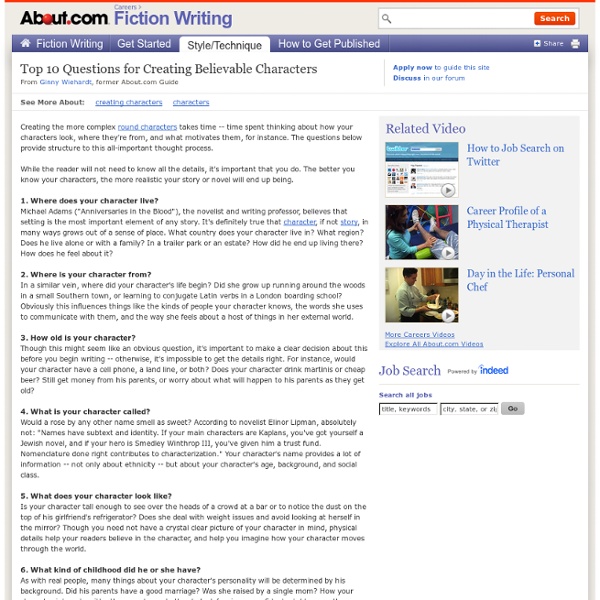10 Days of Character Building: A Day in the Life
This is Day 2 of 10 Days of Character Building The day in the life approach to developing a character is focused on describing a normal day in the character’s life before something important happens to change it. Most central characters begin a story in their normal world. At some point, an event happens that takes them out of their normal world and sends them on whatever journey the story has in store for them.
Creating a character profile
When you get an idea for a short story or a novel you probably get the basic idea of the characters with it. But in order to build believable characters you need more than just a basic idea of them. You need to really them. The easiest way to flesh out a character is with a character profile, so get out a blank sheet of paper and follow the sample profile below. NAME: Put your characters full name - first, last, and any nicknames that he goes by. Make sure the name creates the right mental image of your character; a Bill causes a completely different image than a Byron.
Creating an Original Character
By Maisha Foster-O'Neal You've heard the old maxim before... 'a character can make or break your story.'
The Ultimate Guide to Writing Better Than You Normally Do.
Writing is a muscle. Smaller than a hamstring and slightly bigger than a bicep, and it needs to be exercised to get stronger. Think of your words as reps, your paragraphs as sets, your pages as daily workouts.
25 Things You Should Know About Character
Previous iterations of the “25 Things” series: 25 Things Every Writer Should Know 25 Things You Should Know About Storytelling And now…
How to Create a Character
by Holly Lisle All Rights Reserved No matter what sort of fiction you’re writing, you’re going to have to populate your story with characters, and a lot of them, if not all of them, you’re going to have to create from scratch. Unfortunately — or maybe fortunately — there is no Betty Crocker Instant Character-In-A-Can that you can mix with water and pop into the oven for twenty minutes. There aren’t any quick and easy recipes, and I don’t have one either, but I do have some things that have worked for me when creating my characters, and some things that haven’t. You may find my experiences useful. For what they’re worth, here are my Do’s and Don’ts.
Amy Redwood
Over time, I came across quite a few websites for aspiring writers. Some of them I bookmarked, so I thought I’d share my collection (all external links). Introduction to Fiction Writing and Reading Short Stories Advanced Essay Workshop
Pixar’s 22 Rules of Storytelling « Aerogramme Writers' Studio
These rules were originally tweeted by Emma Coats, Pixar’s Story Artist. Number 9 on the list – When you’re stuck, make a list of what wouldn’t happen next – is a great one and can apply to writers in all genres. You admire a character for trying more than for their successes.You gotta keep in mind what’s interesting to you as an audience, not what’s fun to do as a writer. They can be very different.Trying for theme is important, but you won’t see what the story is actually about til you’re at the end of it.
Establishing the Right Point of View
Establishing the Right Point of View: How to Avoid "Stepping Out of Character" by Marg Gilks Return to Characters, Viewpoint, and Names · Print/Mobile-Friendly Version "Dalquist was shaking with rage, tears streaking down her face. 'Get out,' she whispered.
Plotting Your Novel
by Lee Masterson "By failing to plan, you are planning to fail." A good story is made up of a logical beginning, a bumpy middle and a satisfying end. But a good plot is made up of more than just these three basics. Plotting an entire novel is a complex task, best summed up by saying it is the author's way of showing the reader the events as they are unfolding.
Manuscript Format for Novels
by Glen C. Strathy The manuscript format used in publishing has evolved a little over time as technology has changed, and if you grew up with word processors, it may seem rather quaint, old-fashioned, and downright boring to look at.
Seven Keys To Unforgettable Characters
Think of your favorite book. What the first thing that comes to mind when you bring it up in your brain? I’m willing to bet, it’s the characters. Most people relate to people, not things. Characters bring emotion to story, and emotion is what attaches readers to books. It took me a while to truly appreciate this fundamental truth of fiction.



